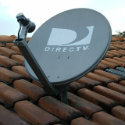Despite potential regulatory hurdles, Dish viewed as a logical candidate to combine with the struggling satellite TV service provider.

AT&T's honeymoon with DirecTV is long over. Its marriage could be next.
The company is "exploring" ways to unload DirecTV, the satellite TV giant it acquired roughly four years ago for $49 billion, the Wall Street Journal reported.
Multiple options are being considered, including a spin-off of DirecTV or a sale/merger with Dish Network, the report said. AT&T also might ultimately decide to hold onto those assets, which still throw off lots of cash.
AT&T declined to comment on the WSJ report. Charlie Ergen, Dish chairman and founder, told NBC News Tuesday that he had been pitched the idea of combining with DirecTV but stressed that no formal talks had occurred.
Ergen was glib when the topic came up this week at the Goldman Sachs Communacopia conference. "We'd look at anything," he said, noting that there's always been "industrial logic" for a Dish-DirecTV merger. "We're practical... not emotional. As a company if we can buy a paperclip manufacturer and make money, we'd buy a paper clip company."
Update: AT&T is not considering a split with DirecTV "right now" as it weighs options to boost its business, according to CNBC, citing unnamed sources said to be familiar with the situation.
The WSJ report that AT&T is exploring options for DirecTV emerges a little more than four years after AT&T acquired the company in 2015 for $49 billion. Soon after, AT&T tried to parlay the acquisition into new video/wireless bundles and, in November 2016, launched DirecTV Now, an OTT-TV service.
DirecTV has struggled under AT&T. The satellite TV division has been hemorrhaging subscribers at a terrific rate (AT&T lost 778,000 legacy "premium" TV subs -- DirecTV and U-verse TV -- in Q2 2019) in an age of cord-cutting and high levels of churn amplified by the end of promotional pricing periods.
DirecTV Now, recently rebranded as AT&T TV Now, is also losing subs (168,000 in Q2 2019 alone) following the end of discounted pricing. AT&T has vowed to slow the losses and to boost the overall profitably of its pay-TV business.
Elliott pushing for a DirecTV divestiture
Word that AT&T is mulling options for DirecTV also follows recent pressure from activist shareholder Elliott Management, which is calling for AT&T to overhaul its front-office management, shed unneeded businesses and further reduce costs.
In its September 9 letter to the AT&T board, Elliott, which recently snapped up a $3.2 billion stake in AT&T, cited "damaging results" from the DirecTV acquisition. AT&T, Elliott said, should consider divesting the DirecTV assets as the company conducts a broader review of its business.
"Unfortunately, it has become clear that AT&T acquired DirecTV at the absolute peak of the linear TV market," said Elliott, which also viewed AT&T's Mexican wireless operations and pieces of its wireline footprint as candidates for divestment because they are "no longer complementary" with AT&T's future strategic direction.
It appears that AT&T is listening to Elliott's suggestions, though it's not clear whether AT&T is taking to Elliott's specific recommendation to divest DirecTV to heart.
Speaking Tuesday at the Goldman Sachs Communacopia conference in New York, AT&T Chairman and CEO Randall Stephenson called Elliott's suggestions a "mixed bag" and said the AT&T board is discussing and evaluating them in depth. While some of Elliott's ideas make sense, "there are some other areas you look at … and it's not quite as clear as to why that would make sense for us," Stephenson said.
Dish viewed as a logical frontrunner
Fox Business reported this week that Wall Street bankers "have been inundating" AT&T with proposals to sell DirecTV, with Dish among the potential suitors.
A deal involving DirecTV and Dish has been percolating for months.
In June, UBS analyst John Hodulik said AT&T could attempt to spin out DirecTV to help put some distance between AT&T and its declining pay-TV business, with Dish viewed as a sensible candidate.
Such a deal, Hodulik said, would give AT&T substantial tax benefits and boost its shares by as much as 20%. Meanwhile, adding DirecTV would help Dish gain more scale for its pay-TV business, which is also struggling, and establish a "more stable cash flow machine to fund its wireless ambitions," he said.
Dish and DirecTV tried to merge in 2002 but regulators blocked it over concerns the deal would be anti-competitive. Seventeen years later, such a deal might stand a better chance to pass regulatory muster. The pay-TV landscape looks a lot different now -- overall subscriber numbers are dropping, with traditional providers getting hit particularly hard from cord-cutting and the emergence of popular OTT options. A merger of Dish and DirecTV could provide the strength and stability needed to weather the storm.
But AT&T might need some more convincing. Speaking at an investor conference last week, AT&T CFO John Stephens said he understood the "industrial logic" [Ed note: Stephens and Ergen agree on that, at least.] of a Dish-DirecTV combo, "but quite frankly it's been tried and has been rejected."
Related posts:
— Jeff Baumgartner, Senior Editor, Light Reading
About the Author(s)
You May Also Like










